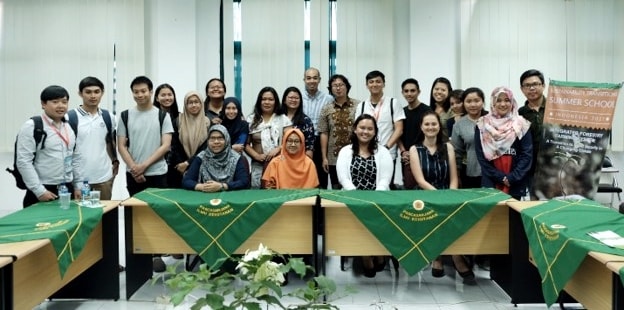LOS BAÑOS, Laguna – The European Commission's ERASMUS+ Capacity Building for Higher Education funded project on Joint MS Food Security and Climate Change has been completed and is currently undergoing approval in partner universities who will implement it by AY 2020-2021.
The MS FSCC project aims to develop professionals who will address the challenges of food security in the context of the ASEAN integrated market. The developed joint degree was based on the model of Erasmus Mundus Joint Master Degrees in Europe. The project has brought Southeast Asian Regional Center for Graduate Study and Research in Agriculture (SEARCA), and leading higher education institutions in agriculture and life sciences from the Philippines, Indonesia, Thailand, Malaysia and Europe together to build a joint Master's Degree on the topic of Food Security and Climate Change.
Participating institutions planning to offer the degree include University of the Philippines Los Baños (UPLB) in Los Baños, Laguna, Philippines, Universitas Gadjah Mada (UGM) and Institut Pertanian Bogor (IPB) in Indonesia, Kasetsart University in Bangkok, Thailand, Universiti Putra Malaysia (UPM) in Selangor, Malaysia. These HEIs have been working together within the University Consortium for Graduate Education in Agriculture and Natural Resources (UC) with SEARCA serving as Secretariat. In 2019, Universitas Brawijaya (UB) in Malang, Indonesia became a regular member of the UC and the institution also expressed their interest in offering the joint MSFSCC in their university. Tokyo University of Agriculture (Tokyo-NODAI) and National Taiwan University (NTU), UC associate members, also committed to accept MSFSCC students for the non-degree mobility. Mobility activities will also be conducted in Montpellier SupAgro in France, Gottingen University in Germany, and BOKU in Vienna, Austria. These activities enable students to get the best offerings and perspectives from different institutions by taking courses and conducting research
Simultaneous with the development of the joint curriculum since 2017, the project has offered a double/dual degree in MS FSCC with three batch of students successfully participating until 2019. These students participated in exchanges in Southeast Asia and in Germany, summer schools, and joint research. The Summer School is an intensive course on Sustainability Assessment in Agricultural Production and Food Processing and is a required course in MS FSCC which combines theory, case studies, group discussions, and fieldwork. It was first conducted in 2017 at UGM in Yogyakarta, Indonesia with the theme: Integrated Forestry Farming System: A Transition to Food Security in a Changing Climate. This was followed in 2018 with Oil Palm-Cattle Integration: A Transition Towards Sustainability in Food Security and Climate Change hosted by UPM in Malaysia and lastly, in 2019 organized by UPLB in the Philippines with the theme Sustainable and Resilient Food Systems in Vulnerable Areas. For 2020, UB in Indonesia will be hosting the Summer School.
These activities were vital in improving the joint MS FSCC curriculum that was being developed as it brought together students and experts from different parts of Southeast Asia and Europe which created a global discussion on the issues of food security and climate change. One of the dual/double MS FSCC graduates, Mr. Ariyanto Kurnia Bagus, received three MS degrees from IPB, KU, and Montpellier SupAgro.
Back-to-back with the Summer Schools were the Training of Trainers (ToT) which aims to assist staff and faculty of institutions in terms of planning and implementing the MS FSCC core courses and in handling the technical and administrative challenges that comes with it. Other Southeast Asian partners of the project who have also participated in the activities but are non-UC members include Chiang Mai University and Prince of Songkla University both in Thailand, Central Luzon State University (CLSU) in the Philippines, University of Battambang (UB) and Royal University of Agriculture (RUA) both in Cambodia. RUA and CLSU both expressed their intention to also offer the developed joint degree in MS FSCC.
For more information about the joint MS FSCC program, visit https://msfscc.org


